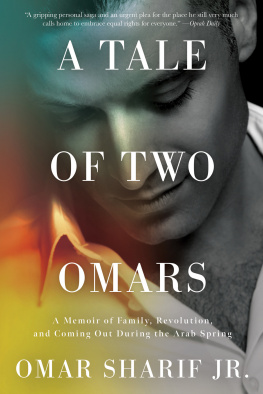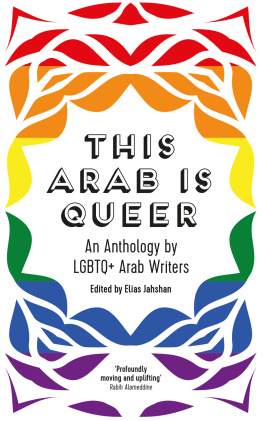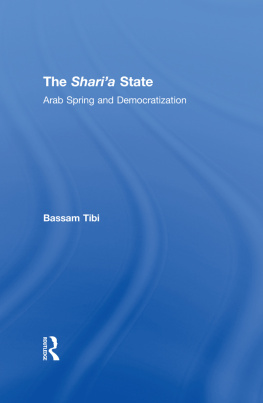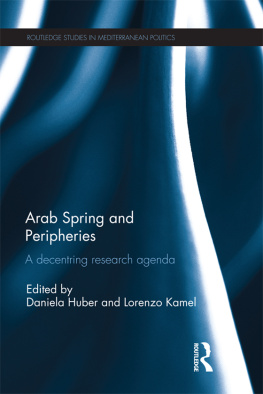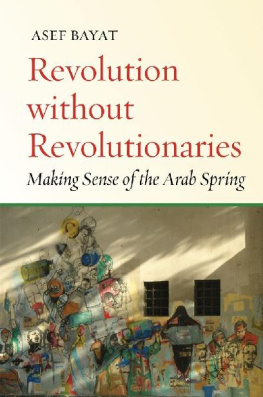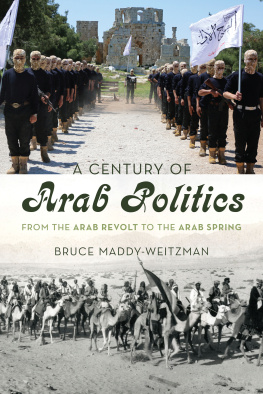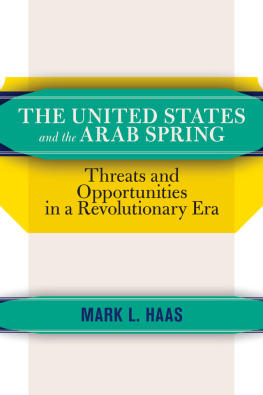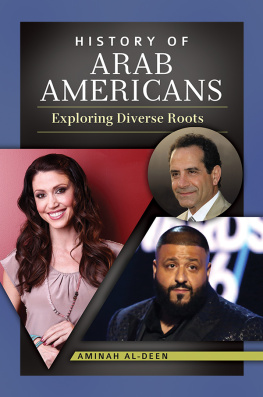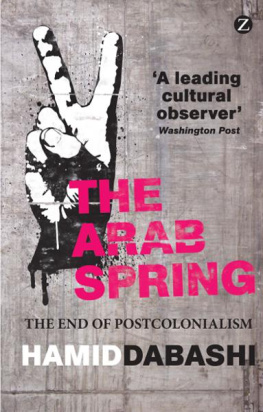Table of Contents
Guide
Page List
Praise forA Tale of Two Omars
A gripping personal saga and an urgent plea for the place he still very much calls home to embrace equal rights for everyone.
MICHELLE HART, Oprah Daily
A moving autobiography.
TZACH YOKED, Haaretz
Heartfelt and heroic.
CAROLINE TAYLOR, Town & Country
Meaningful.
DAVID OLIVER, USA Today
This book is the fascinating and inspiring odyssey of one mans quest to be his authentic selfa difficult enough task for anyone, but try adding gay, Muslim and Jewish into the mix!
ALAN CUMMING
Brimming with beautiful remembrances of his grandfather and terrifying stories of abuse and homophobia, this is an essential book that shines a much-needed light on the intersection of Arab and queer identity.
ABDI NAZEMIAN, Lambda Awardwinning author of Stonewall Honor book Like a Love Story
[Sharif] writes in a manner that is like a good friend telling you a storyhis narration sucks you in and makes you not want to put it down... A compelling story.
EMILY BURACK, Alma
Sharif survives many trials and tribulations on the way to revelation.
Booklist
Sharif Jr., an actor and model, discusses coming to grips with the advantages and disadvantages of his famous name and discovering a balance between two different worlds... Will be of interest to LGBTQ readers, celebrity watchers, and memoirs about coming into ones own.
Library Journal
Moving... Exquisitely personal... An inspirational chronicle of courageous LGBTQ+ advocacy in the face of official repression.
Kirkus Reviews
Sharif, grandson of the legendary Egyptian actor by the same name, bares all with his stirring debut, an account of his extraordinary and turbulent life... This moving story will appeal to anyone looking for an account of inspiration in the face of oppression.
Publishers Weekly
A Tale of Two Omars is a story of freedom. Its about taking all your challenges and privileges, owning them, and using them to live a life in charge.
DIANE VON FURSTENBERG
Omar Sharif Jr.s book cannot come at a better time for humanity and the world. Glamorous, engrossing, and challenging, his edict for a better world is evident in every page.
IRENA MEDAVOY, actress, philanthropist, and entrepreneur
In a story made for the screen, Omar rips away the bandages and exposes the many scars of his past. Harrowing and haunting, but shared with hope and humility, A Tale of Two Omars reminds us how important it is to live our truths without shame. The message is clear: Dont let the past define your future, have it inform and illuminate a future path.
ROSANNA ARQUETTE, BAFTA winner, Emmy- and Golden Globenominated actress


To my grandparents for shaping and molding me.
And to Diane for then offering this advice:
Now, be you.
Im not an activist; Im just a person with a story.
OMAR SHARIF JR.
CONTENTS

Published in The Advocate
March 16, 2012
I write this article in fear. Fear for my country, fear for my family, and fear for myself. My parents will be shocked to read it, surely preferring I stay in the shadows and keep silent, at least for the time being.
But I cant.
Last January, I left Egypt with a heavy heart. I traveled to America, leaving behind my family, friends, and compatriots who were in the midst of embarking on a heroic journey toward self-determination. Despite the sound of gunshots in the streets and the images of Anderson Cooper being struck repeatedly over the head on CNN, I left hopeful that I would return to find a more tolerant and equal society. While I benefited from a life of privilege being Omar Sharifs grandson, it was always coupled with the onerous guilt that such a position might have been founded upon others sweat and tears.
One year since the start of the revolution, I am not as hopeful.
The troubling results of the recent parliamentary elections dealt secularists a particularly devastating blow. The vision for a freer, more equal Egypta vision that many young patriots gave their lives to see realized in Tahrir Squarehas been hijacked. The full spectrum of equal and human rights are now wedge issues used by both the Supreme Council of the Egyptian Armed Forces and the Islamist parties, when they should be regarded as universal truths.
I write this article despite the inherent risks associated because as we stand idle at what we hoped would be the pinnacle of Egyptian modern history, I worry that a fall from the top could be the most devastating. I write, with healthy respect for the dangers that may come, for fear that Egypts Arab Spring may be moving us backward, not forward.
And so I hesitantly confess: I am Egyptian, I am half Jewish, and I am gay.
That my mother is Jewish is no small disclosure when you are from Egypt, no matter the year. And being openly gay has always meant asking for trouble, but perhaps especially during this time of political and social upheaval. With the victories of several Islamist parties in recent elections, a conversation needs to be had and certain questions need to be raised. I ask myself: Am I welcome in the new Egypt?
Will being Egyptian, half Jewish, and gay forever remain mutually exclusive identities? Are they identities to be hidden?
While to many in Europe and North America mine might seem like trivial admissions, I am afraid this is not so in Egypt. I anticipate that I will be chastised, scorned, and most certainly threatened. From the vaunted class of Egyptian actor and personality, I might just become an Egyptian public enemy.
And yet I speak out because I am a patriot.
I am a patriot who remembers a pluralistic Egypt, where despite a lack of choice in the political sphere, society comprised a multitude of beliefs and backgrounds. I remember growing up knowing gay men and women who were quietly accepted by those around them in everyday society. The motto was simple: Stay quiet, stay safe. Today, too many are staying quiet as the whole of Egyptian society moves toward this monolithic entity I barely recognize.
Last month I went for an afternoon run outside my home in Cairo. It was hot, and so I removed my T-shirt. I got the strange sense someone was watching. I felt a car begin to slow behind me, and a man began to shout that I could no longer go out in the streets shirtless in the new Egypt. With reticence, I put my T-shirt on and continued to run.
Today, I write.
I write this article because there are many back home without a voice, without a face, and without an outlet. I write this article because I am not unique in Egypt and because many will suffer if a basic respect for fundamental human rights and equality is not embraced by Egypts new government. I write this article because as an Egyptian national newly acquainted with a land of freedom, I feel a certain privilege that I can finally express myself openly as well as artistically. I have a voice, and with it comes a responsibility to share it during this time of social and political change, no matter the risks.

